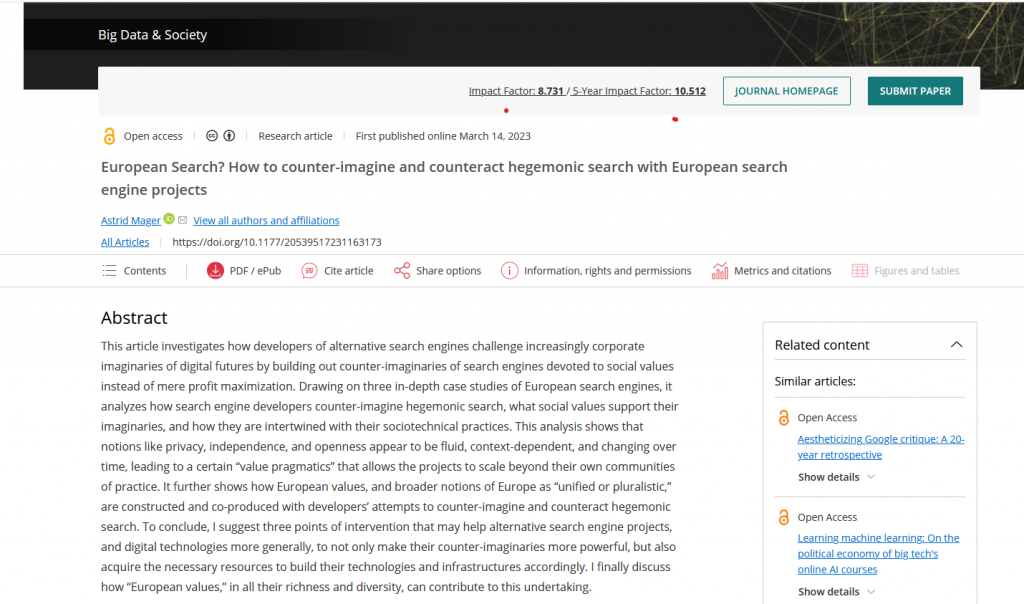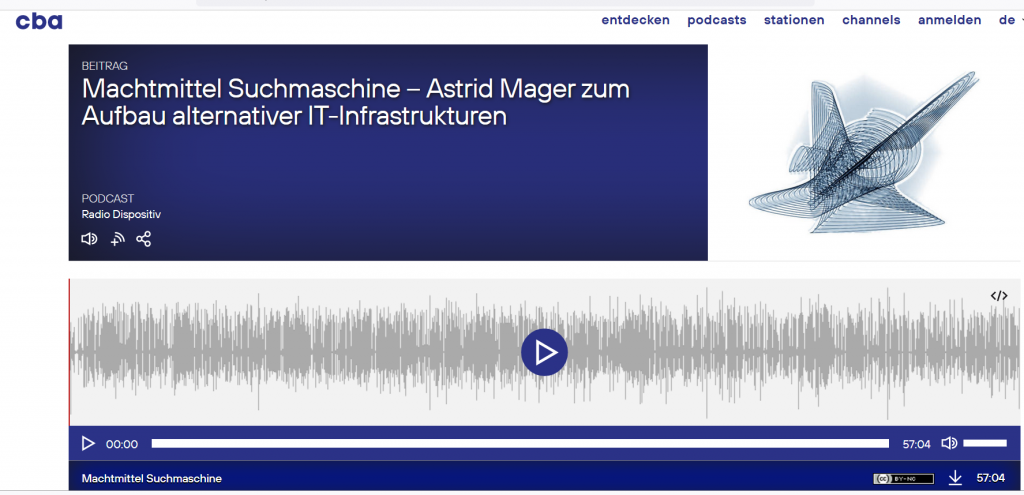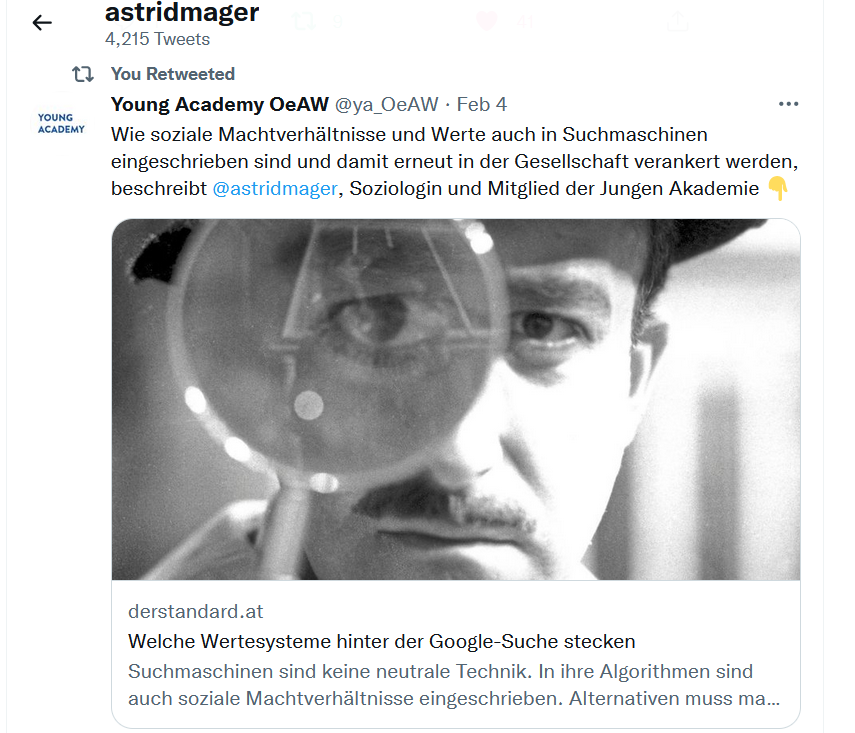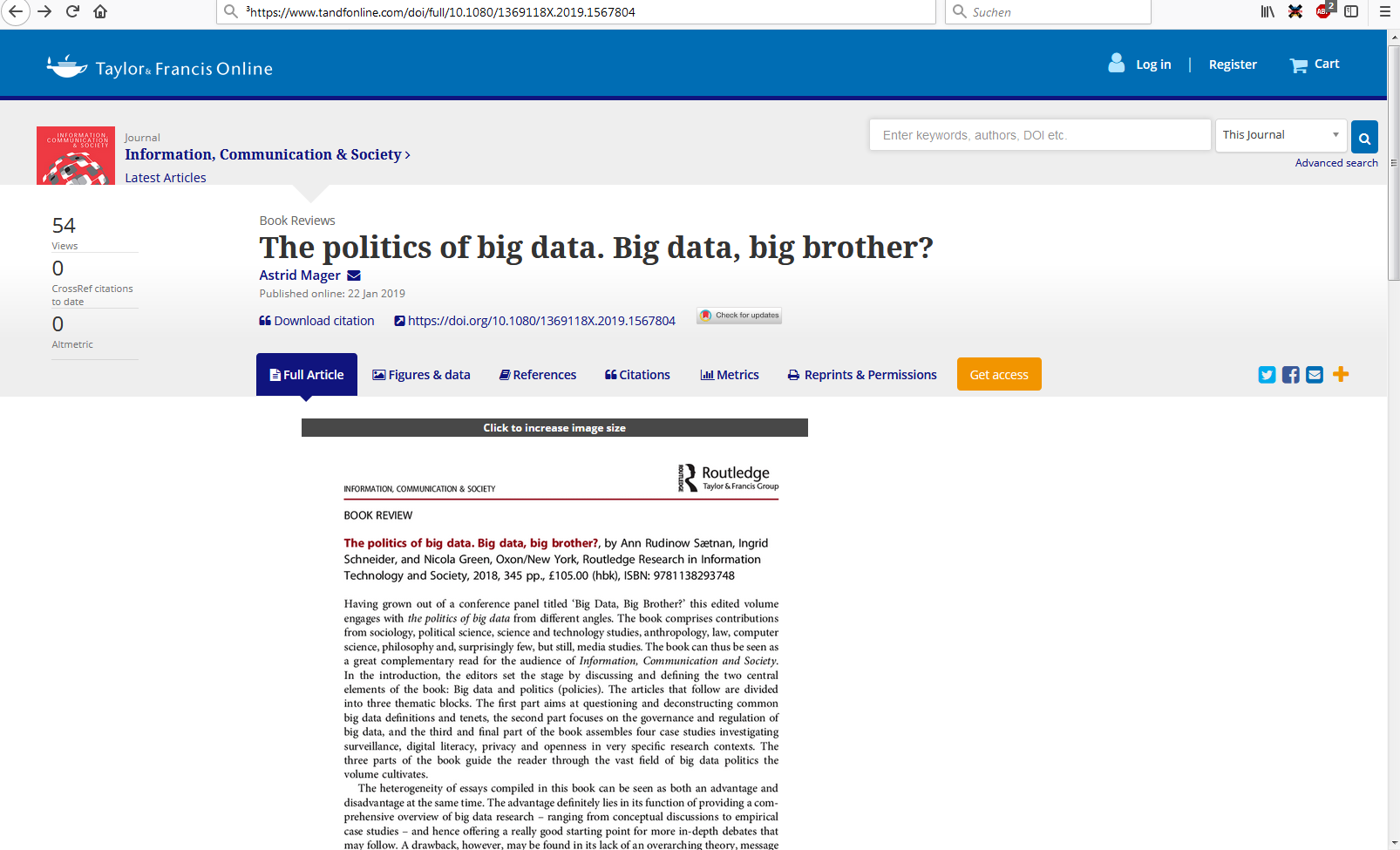I’m very happy that my BD&S special issue article is online now!  It’s called “European Search? How to counter-imagine and counteract hegemonic search with European search engine projects” – it was a bit of a tough nut since critiquing big tech and their sociotechnical imaginaries appears to be much easier than thinking about (and realizing!) alternative technologies and their counter-imaginaries. And that’s exactly why we need to shift our attention from dominant, often corporate imaginaries towards alternative tech and their counter-imaginaries of digital futures – especially in the European context where notions of value-based Europe are strongly pushed in EU policy rhetoric, but remain empty catchphrases often times. To sum up, I’m proud that this article is out now & I would love to hear what you guys think about it!!
It’s called “European Search? How to counter-imagine and counteract hegemonic search with European search engine projects” – it was a bit of a tough nut since critiquing big tech and their sociotechnical imaginaries appears to be much easier than thinking about (and realizing!) alternative technologies and their counter-imaginaries. And that’s exactly why we need to shift our attention from dominant, often corporate imaginaries towards alternative tech and their counter-imaginaries of digital futures – especially in the European context where notions of value-based Europe are strongly pushed in EU policy rhetoric, but remain empty catchphrases often times. To sum up, I’m proud that this article is out now & I would love to hear what you guys think about it!!
Tag Archives: net politics
Talk Radio: Machtmittel Suchmaschine
Im Oktober habe ich mal wieder mit Herbert Gnauer über Suchmaschinen diskutiert (Radio Dispositiv auf Orange, 94.0). Genauer über alternative Suchmaschinen, sowie den Aufbau offener – öffentlich finanzierter – IT Infrastrukturen. Ein offener Web Index könnte die Grundlage für die Entwicklung von ganz unterschiedlichen Suchmaschinen, Ranking-Instrumenten, und Applikationen sein. Er könnte dem gegenwärtigen Monopolisten (Google) eine reichhaltige, buntere, diversere Suchmaschinenlandschaft entgegensetzen. Diese würde wesentlich besser zu unseren “europäischen Werten” – und hier insbesondere dem pluralen, multikulturellen, und diversen Europa – passen, als hegemoniale Ansprüche ein “europäisches Google” zu bauen, dem Europa kaum gerecht werden kann – alleine schon deshalb, weil Europa ganz anders funktioniert als die USA (und China) – Stichwort Datenschutz, aber auch kulturelle Eigenheiten, verschiedene Sprachen, fragmentierte Märkte etc, die es positiv nutzbar zu machen gilt! Ein offener Web Index – wie übrigens auch das dezentrale social network Mastodon – halten daher nicht nur alternative, verteilte, nachhaltigere Technologien für uns bereit, sondern auch alternative Imaginationen von Europa, die es weiter zu verfolgen gilt.
Zwei Initiativen machen sich hier insbesondere starkt: Die Open Web Index Initiative und die Open Search Foundation, die beide den Aufbau einens offenen Web Indexes anstreben. Es lohnt sich diese großartigen Projekte im Detail unter die Lupe zu nehmen!
Vielen Dank Herbert, dass Du diesen Ideen Raum in Deiner Sendung geboten hast! Es ist mir immer wieder eine Freude! Spoiler: zwei wiss. Artikel dazu sind gerade im Erscheinen (Big Data & Society) & in Begutachtung (book Project Europe) – more info coming soon!
Link zur Sendung Dispositiv auf Radio Orange 94.0: Machtmittel Suchmaschine – Astrid Mager zum Aufbau alternativer IT-Infrastrukturen
event & panel discussion: google, governance, & possible interventions
On the 12th of April we’ll host a big event at the newly renovated Austrian Academy of Sciences. I’ll first present the results of my long-standing habilitation project “Algorithmic Imaginaries” (funded by the Austrian Science Fund; Elise Richter Program), followed by a panel discussion with leading search engine scholars from all over Europe. Together with Elizabeth Van Couvering, Rosie Graham, and Bernhard Rieder we’ll discuss Google, surveillance capitalism, and discrimination; moderated by Ov Cristian Norocel and Richard Rogers. All infos and registration on-site can be found here; there’ll be a stream too!
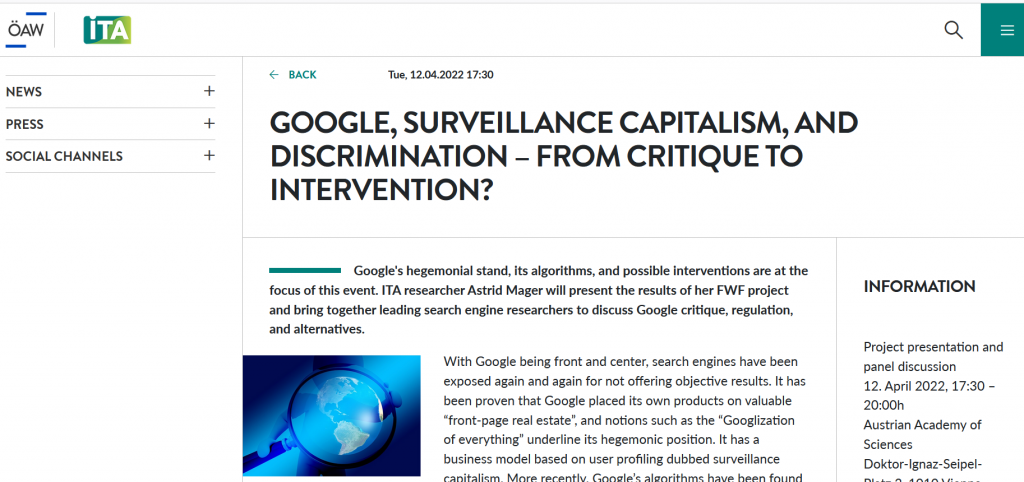 Before the public event we’ll be holding a writing workshop at the Institute of Technology Assessment to discuss the manuscripts for our special issue “From Google Critique to Intervention” to be published by Big Data & Society. I’m already looking forward to this get-together!! The video of the event can be found here.
Before the public event we’ll be holding a writing workshop at the Institute of Technology Assessment to discuss the manuscripts for our special issue “From Google Critique to Intervention” to be published by Big Data & Society. I’m already looking forward to this get-together!! The video of the event can be found here. 
If you’d like to learn more about my project “Algorithmic Imaginaries” you might watch this video of the lecture I gave in Feburary as part of the ÖAW’s gender & diversity lecture series (in German). This lecture sparked quite some media attention including a cover in Der Standard’s “Forschung Spezial” 
AMS-algorithm_final report out! yay!
Finally, our report of the project on the so-called AMS-algorithm is out!!! YAY!!! It was a lot of work, but it was definitely worth it! It is an in-depth sociotechnical analysis and deconstruction of the algorithm the Austrian public employment service (AMS) is planning to roll out all over Austria starting from January 2021. The algorithm poses several severe challenges on both the institutional level and the larger societal level, as we – Doris Allhutter, Florian Cech, Fabian Fischer and Gabriel Grill – argued in our report. We’d like to thank the Upper Austrian Chamber of Labor (AK OÖ) that financed our study and particularly Dennis Tamesberger for his support throught the process. Here you can download the full report.
 The report triggered lots of media coverage, e.g. in APA Science or at orf.at. We also did some interviews, e.g. for the Austrian Academy of Sciences, Futurezone or the radio broadcast Ö1 (all in German). The final report is in German, but english publications will (hopefully) follow SOON! For now I’d like to point you to the english publications in New Frontiers in Big Data that we published a year ago (only based on publicly available materials back then, but still relevant in its argumentation):
The report triggered lots of media coverage, e.g. in APA Science or at orf.at. We also did some interviews, e.g. for the Austrian Academy of Sciences, Futurezone or the radio broadcast Ö1 (all in German). The final report is in German, but english publications will (hopefully) follow SOON! For now I’d like to point you to the english publications in New Frontiers in Big Data that we published a year ago (only based on publicly available materials back then, but still relevant in its argumentation):
Allhutter, D., Cech, F., Fischer, F., Grill, G. & Mager, A. (2020) “Algorithmic Profiling of Job Seekers in Austria: How Austerity Politics Are Made Effective”, Frontiers in Big Data (Special Issue Critical Data and Algorithm Studies), full text; open access here.
book review “the politics of big data”
Here’s my book review of The Politics of Big Data. Big Data, Big Brother? by Ann Rudinow Sætnan, Ingrid Schneider, and Nicola Green for the journal Information, Communication & Society. It’s a great compliation of articles dealing with the politics and policies of big data in different contexts!
CfP – NM&S special issue
This is the CfP for the special issue in New Media & Society I guest-edit together with Christian Katzenbach: “We are on a mission”. Exploring the role of future imaginaries in the making and governing of digital technology. All relevant information can be found here:
(un)making europe
 Tomorrow I’ll be going to the conference by the European Sociological Association in Athens. The conference theme is (Un)Making Europe. Capitalism, Solidarities, Subjectivities. I’ll be giving a talk on the co-production of search technology and a European identity in the session “information technologies & society” organized by Harald Rohracher. It’s related to my article “search engine imaginary” that got published in Social Studies of Science just recently. It’s pretty unusual for me to give a talk about finished work, but I thought I had to submit something since this research corresponds to the overall conference topic so well. 😉
Tomorrow I’ll be going to the conference by the European Sociological Association in Athens. The conference theme is (Un)Making Europe. Capitalism, Solidarities, Subjectivities. I’ll be giving a talk on the co-production of search technology and a European identity in the session “information technologies & society” organized by Harald Rohracher. It’s related to my article “search engine imaginary” that got published in Social Studies of Science just recently. It’s pretty unusual for me to give a talk about finished work, but I thought I had to submit something since this research corresponds to the overall conference topic so well. 😉
Here’s the conference abstract and the link to the full paper:
(Un)Making Europe in the Context of Search Engine Policy
This article discusses the co-production of search technology and a European identity in the context of the EU data protection reform. The negotiations of the EU data protection legislation ran from 2012 until 2015 and resulted in a unified data protection legislation directly binding for all European member states. I employ a discourse analysis to examine EU policy documents and Austrian media materials related to the reform process. Using the concept ‘sociotechnical imaginary’, I show how a European imaginary of search engines is forming in the EU policy domain, how a European identity is constructed in the envisioned politics of control, and how national specificities contribute to the making and unmaking of a European identity. I discuss the roles that national technopolitical identities play in shaping both search technology and Europe, taking as an example Austria, a small country with a long history in data protection and a tradition of restrained technology politics.
“netzpolitischer abend”
 Genau vier Wochen nach dem letzten Netzpolitischen Abend AT gibt es am ersten Donnerstag im Monat, konkret dem 2. März, wieder drei spannende Vorträge zu netzpolitischen Themen – wie üblich ab 19:30 Uhr im Wiener Metalab in der Rathausstr. 6:
Genau vier Wochen nach dem letzten Netzpolitischen Abend AT gibt es am ersten Donnerstag im Monat, konkret dem 2. März, wieder drei spannende Vorträge zu netzpolitischen Themen – wie üblich ab 19:30 Uhr im Wiener Metalab in der Rathausstr. 6:
- Astrid Mager (Institut für Technikfolgenabschätzung, @astridmager): Suchmaschinen in Europa. Europäische Suchmaschinen?
- Maximilian Schubert (@ISPA_at): „Netzsperren in Österreich“
- Wolfie Christl (@WolfieChristl): Big-Data-Business, Profiling & Privacy
 Und hier der Link zum Nachsehen und Nachhören. Danke an alle, va Herbert Gnauer (von Idealism Prevails) für’s streamen & schneiden, war sehr fein!!
Und hier der Link zum Nachsehen und Nachhören. Danke an alle, va Herbert Gnauer (von Idealism Prevails) für’s streamen & schneiden, war sehr fein!!
algorithmic imaginaries & algorithmic regimes
 My new research project “Algorithmic Imaginaries. Visions & values in the shaping of search engines” is online (on the ITA Website)!
My new research project “Algorithmic Imaginaries. Visions & values in the shaping of search engines” is online (on the ITA Website)!  Thanks to Thomas Bayer for his help!
Thanks to Thomas Bayer for his help!
 Further, the short videos on “Algorithmic Regimes” by Felix Stalder & Konrad Becker (World-Information Institute) are online too! The project is called Painted by Numbers, which is a great name I think! All videos are focusing on algorithmic logics and culture/ politics/ regulation etc. It’s really a great compilation of people and statements on algorithmic power in contemporary society. The videos will be assembled as video installations in art exhibitions. You can watch all of them here.
Further, the short videos on “Algorithmic Regimes” by Felix Stalder & Konrad Becker (World-Information Institute) are online too! The project is called Painted by Numbers, which is a great name I think! All videos are focusing on algorithmic logics and culture/ politics/ regulation etc. It’s really a great compilation of people and statements on algorithmic power in contemporary society. The videos will be assembled as video installations in art exhibitions. You can watch all of them here.
*happy*
I’m so (so so so) happy that my project “Algorithmic imaginaries. Visions and values in the shaping of search engines” will finally come true! After a really long application process the Austrian Science Fund (FWF) decided to fund this awesome habilitation project! You’ll find the abstract below; more information will follow once the project has started (November 2016 since I’m still on maternity leave). For all of you who have projects under review (or rejected already): don’t give up! It’s a nerv-wrecking process, but if you finally manage to succeed, it’s all worth it!!! (Of course, in times like these peer review has become some sort of strage academic lottery, which does not make the practice any better..)
Algorithmic imaginaries.
Visions and values in the shaping of search engines
Search engines like Google are developed in the US-American context, but are used around the globe. Their business models are based on user-targeted advertising. They collect user data, turn it into user profiles, and sell them to advertising clients. Since the NSA affair practices of user profiling are critically discussed; especially in European contexts with diverse data protection laws, historically shaped notions of privacy, and very different tax systems. The ongoing reform of the EU data protection legislation is an important arena where tensions between global search engines and European policy visions and values can be observed. Besides, European search engines emerge that aim to provide users with alternative styles of search. Some are explicitly developed as a European competitor to US-based search engines (Quaero or Independent Web Index). Others are developed in Europe, but draw on other value-systems to distinguish themselves from big search engines, such as respecting users’ privacy (e.g. Ixquick), protecting the environment (e.g. Ecosia), or creating a non-commercial search engine owned by the public (e.g. YaCy).
This poses important questions: What motivations, value-systems, and visions guide the development of European search engines? How are these imaginations translated into sociotechnical design practices? What power struggles, negotiations, and compromises may be observed? How do place and cultural context matter in the design process? Researchers in Science and Technology Studies (STS) investigated the politics of search engines, the relevance of algorithms, and internet governance. What is missing is an in-depth analysis of the shaping of search engines in specific cultural contexts and the role shared value systems and visions play in it. Rooted in the discipline of STS the suggested habilitation project will fill in this gap by investigating design practices of European search projects using a case-study approach (qualitative interviews, workshops, ethnographic observations).
Results from this analysis will be compared to and cross-analyzed with results from my past research on capitalist ideologies driving global search engines like Google and my present research on visions and values guiding European search engine governance. This overall analysis will result in a typology of algorithmic imaginaries, which describes visions and values in the development and governance of search engines in global, European, and local contexts. It will show how search technologies and society co-emerge in specific economic, political, and cultural settings. The primary focus on European contexts is a particular strength of the project since tensions between global search engines and European governance structures and search projects are growing, but have not been systematically studied yet, both in the field of STS and internet research.

